“My Whole Head Is Full of the Fact That I Am Not Needed”
A third of older people in Russia live in a state of chronic loneliness. We tell you who and how is trying to fight this problem — and how it can be prevented for new generations
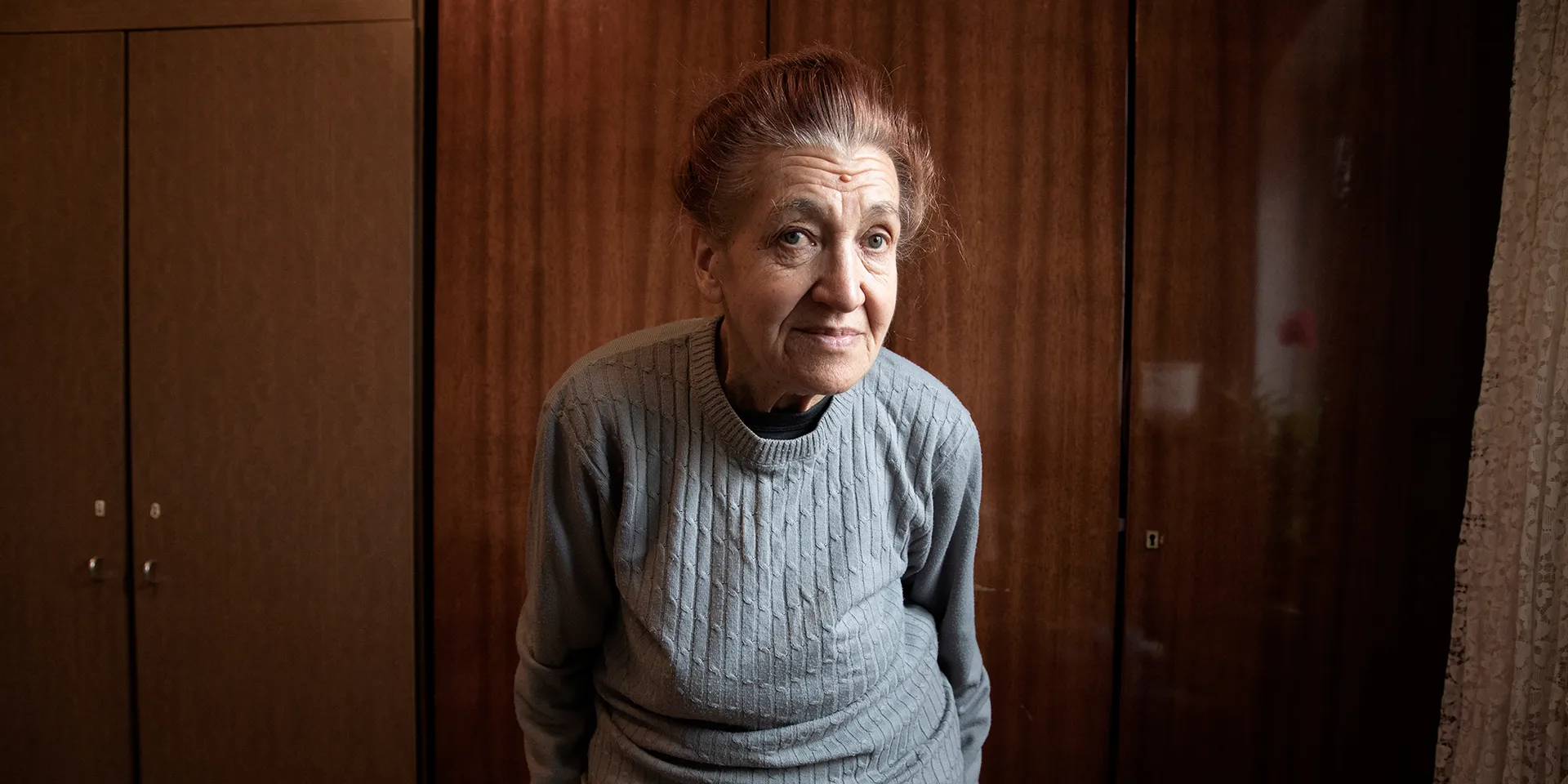
Almost every day, in any weather, Taisiya Mikhailovna from Saratov sells herbs and vegetables. Not far from the Church of the Apostles Peter and Paul, next to the tram stop, a spontaneous bazaar gathers every day: pensioners (summer residents of the area) bring apples, preserves, and sell home-made bouquets. Taisiya Mikhailovna also settles-in among them. On turned-over vegetable crates, she lays out small yellow apples, radishes of different sizes, and a container of water in which, like bouquets, there are bundles of herbs. She sells them for 25 rubles. She may make 100-200 rubles a day — a small amount, but an increase to a pension of 15 thousand.
Material distress isn’t her main problem. Taisia Mikhailovna has nowhere to go in the city — she has almost no friends left, and she lives with her brother at home. Their relationship is not going well. She gives all the money she earns to her younger niece in the hope that she will someday take her away to live with her. When asked if she feels lonely, the pensioner cries: "It's a shame that my money is needed, but nobody needs me."
Loneliness and a sense of uselessness are among the main problems of Russians over 60, along with poverty and poor health, according to a 2017 poll by VTsIOM. However, most elderly people have children and other relatives. (Click the fact check button at the top of the page to see more data and sources of information). According to the "Russia Longitudinal Monitoring Survey of HSE" (RLMS-HSE) in 2016, cited by sociologist M.V. Kornilova, 92% of elderly Russians surveyed have children. According to Rosstat's Comprehensive Surveillance of Living Conditions (CSLC) in 2020, 78% of pensioners have children living separately.
As of 2021, 37 million people of retirement age live in Russia — meaning approximately every fourth resident of the country is a pensioner. In official documents, you can find the concept of "survival time", or "survival age" — the average number of years that a person lives after retirement. For Russian men it is about 17 years. For women it’s about 27. In developed countries, pensioners spend these years traveling, communicating with family and friends, and participating in public and political life. The surviving years of Russian pensioners are often more accurately described as years of survival, and loneliness plays a major role here.
"Important Stories" traveled to the Saratov region, one of the worst regions for the elderly in many respects, to talk with pensioners about how they cope with loneliness and whether anyone is helping them with it.
According to the To Be Precise project, the Saratov Region is one of the worst Russian regions for pensioners in terms of poverty, employment and social activity. Only 14% of Saratov pensioners officially work (for example, in Moscow, one of the best regions for elderly living, 27% work), 21% attend leisure activities (52% in Moscow), 44% of pensioners lack money for clothing and housing and utility bills (in Moscow it’s 6%).
Loneliness is like a disease
Every month, Taisiya Mikhailovna gives two thousand rubles from her pension to her brother and his daughter, “for living [expenses].” When she was sick and was "completely knocked flat," she gave five thousand.
The pensioner's winter shoes were torn. For warm clothes she has a faded winter jacket. “One friend especially needled me, she said ‘Throw this jacket away, buy yourself a new one,'” says Taisia Mikhailovna. “I say: 'Okay but I have no money now.’” Taisiya Mikhailovna hardly buys food: “the main thing is that the first is always at home”. “I love sausage,” she admits. “But the sausage is now all so ... Very expensive, 500 rubles. I don’t get that kind. ”
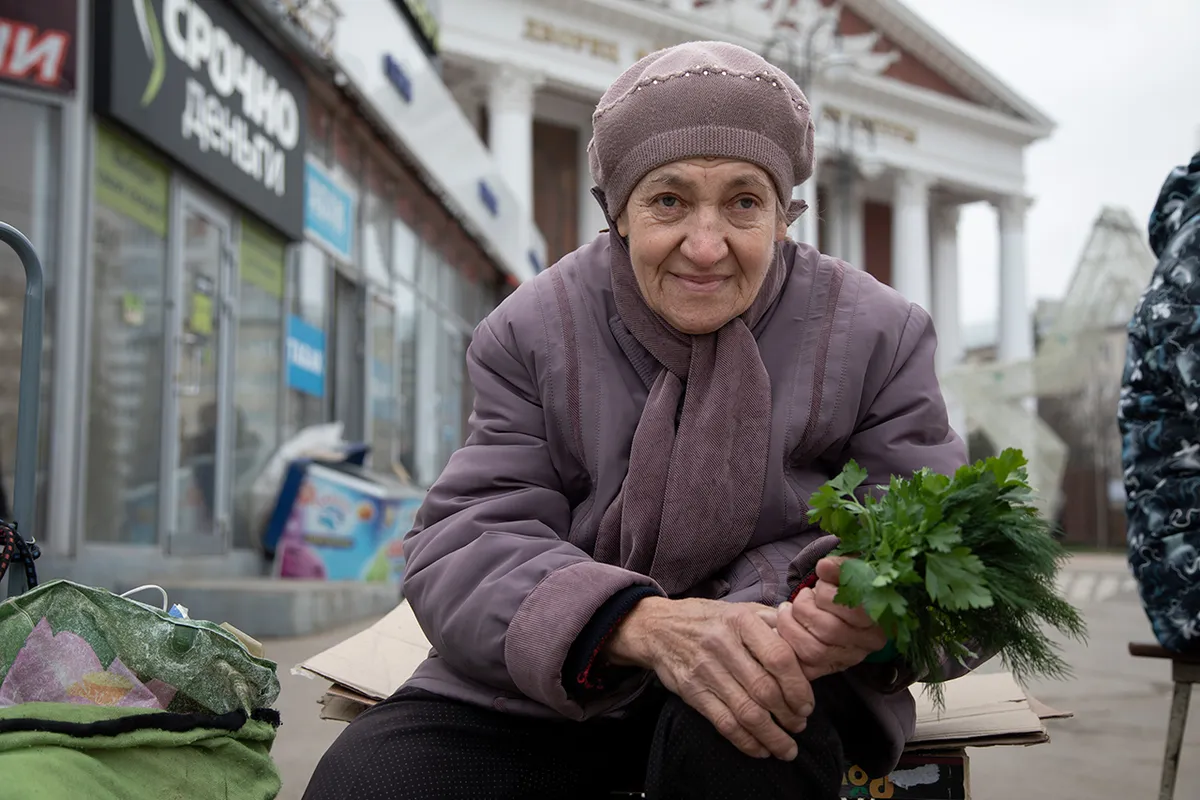
Sociologists describe loneliness as a painful experience that arises from the loss or lack of deep relationships with other people. In addition to damage to the psyche and a deterioration in the quality of life, chronic loneliness can lead to real health problems — dementia, depression, cardiovascular disease. Single people have a 26% higher risk of premature death. The negative impact of loneliness on life expectancy is comparable to smoking or obesity. However, the likelihood of becoming lonely only increases with age. According to the National Research University Higher School of Economics, a third of Russians over 70 often or almost constantly feel lonely.
As well, sociologists Polina Kozyreva and Alexander Smirnov, based on the analysis of data from the Russian Monitor of the Economic Situation and Health of the Population of the National Research University Higher School of Economics (RLMS-HSE) in 2018, note that loneliness is directly related to poverty — “lack of financial resources leads to a decrease in a person's social activity, it limits the number of contacts with other people, opportunities for communication.” According to the National Research University Higher School of Economics, 50% of the poorest people over 70 experience chronic loneliness. Rosstat also records the link between poverty and loneliness. The majority of pensioners in the country are poor. Pensions in Russia are only 29% of the average salary. The average pension in the country is 15 thousand rubles, like that of Taisia Mikhailovna.
According to Rosstat data for 2020, 80% of retirees are struggling to make ends meet. Among all households, the number is slightly lower — 76%. More than 60% cannot cope with unexpected expenses, such as urgent medical treatment or a washing machine replacement. The same number cannot find the money to spend a week of rest away from home once a year, including visits to relatives and friends. A third of pensioners, due to lack of money, cannot invite guests to family holidays.
The higher the share of spending on food, the poorer people are. For Russian pensioners about half of their consumer spending is on food, according to official figures. In Europe, it is almost three times less. On average, in the EU, spending on food for people older than 60-years accounts for 17% of costs (in Luxembourg — 9%, and in Denmark, the Netherlands, Germany and Norway it’s 11%).
In 2017, RANEPA (Russian Academy of National Economy and Public Administration under the President of the Russian Federation) conducted a survey among labor veterans. Various benefits are provided for them — for example, for travel and utilities. According to a RANEPA study, half of *labor veterans, even in spite of benefits, limit themselves to basic needs due to lack of money. Every third of them neglects fruit, and every fourth passes-up meat. The same number cannot buy the medicines they need.
"We need old people more than they need us"
In the morning Taisiya Mikhailovna, with a half-empty cart, leaves the house for the Privoz market — you have to go by making several transfers on a number of trams. In addition to herbs, she buys vegetables for the only person with whom she has a good relationship, her niece Yulia.
Yulia, the daughter of Taisiya Mikhailovna’s deceased younger sister, also lives in Saratov, on the outskirts of the city. She has two children — her youngest daughter is only four months old. Several times a month, and sometimes more often, Taisiya Mikhailovna loads her battered cart in the Pobeda discount store, which is also on Privoz, with potatoes, carrots, and milk — up to 15 kilograms — all for her niece.
“She called today — they’ve got no potatoes,” says the pensioner. “Before that, I bought her only two kilograms, as there was no more money. I often buy groceries for them. A friend scolds me: ‘You don’t need them, don’t help them!’ And the kids are so small. They have not eaten. Well, what am I to do? I feel sorry for them. I can’t stand it, so I go to the store again and buy something.”
Taisiya Mikhailovna does not get anything for herself at the market. She recalls that she often baked pies before — her "signature" was open-faced with dried apricots, but she hasn’t made it since her sister's death. The pensioner dreams of feeding her niece's family with pies, but she cannot handle the dough and filling with just two hands. She hasn’t cooked for herself in a long time: "Why this волокита?"
Though she doesn’t live close to her niece's house, Taisiya Mikhailovna just manages to drag the cart up the stairs at the entrance and takes the elevator to a rented one-room apartment. Right in the corridor, the pensioner begins to unload purchases, handing over the heavy bags to Yulia. She does all this without taking off her jacket — she has to hurry to the bazaar; soon people will be heading home from work.
“Without the help of my aunt, I couldn’t make it at all,” says Yulia, holding her baby in her arms. “In tough times, she helps. So I wish her many [more] years of her life, so at least there’ll be help."
Yulia promised her aunt that she’d take her in when the opportunity arises. But so far there’s been no chance of such a possibility. “Well, where will they take me to?” the pensioner sighs. “And so, I think, if only there was money, I would buy some little one-room place with a communal kitchen, and that's it, and I would live independently."
According to a 2018 RANEPA survey , more than half of Russians ages 55 to 65 years old, like Taisiya Mikhailovna, do not count on the help of relatives and friends. Rosstat has other data: that number is 15%.
At the same time, according to a survey by Rosstat, more than 70% of pensioners need help from adult children — and most say they get it. Children help half of them with money, and seven out of ten pensioners get help from children with their household chores, and eight out of ten are looked after during illness.
“We [sociologists] have a saying we often use: we need old people much more than they need us, because they are the ones who show us our social essence,” says sociologist Dmitry Rogozin. “And here there is a paradox — in order to be human, you need to love yourself and live for yourself. But you need to live for yourself in order to give to others. These are the kinds of things old people teach us. "
According to Rogozin's estimates, pensioners give their relatives more than they receive from them — and this doesn’t depend on income levels. By giving part of their personal money to relatives, they leave themselves less. They reduce their own spending on medicines, food, utilities, and save on travel. In many towns and villages, the pension of the elderly has become an “insurance fund” for a large family, all of whose members may not have stable jobs.
"We need old people much more than they need us, because they are the ones who show us our social essence".
Pensioners often seek to share their pensions with relatives because it gives them a sense of their own worth. Rogozin shares the results of his observations: “It's a shame that they need to come up with reasons to see their grandchildren. So as to not have to wait for a birthday, they call and say: "I got my pension, come over and I’ll leave some for you." So you can’t stand up and moralize and say, ‘Why don’t you think about your health!’ This is thinking about health — because this is another reason for relationships with people.”
The majority of Russian pensioners — 66% — live in the same settlement as their adult children. At the same time, elderly people have to look for reasons to communicate with children and grandchildren. This has not always been the case. In the pre-industrial era, the older generations were included "in a network of close family and kinship relationships, and felt in demand in their family, not alone, making an irreplaceable contribution to the process of socialization of the younger generation." Today families are organized differently — the elderly are less likely to play the role of revered "bearers of wisdom." A lack of demand in their own families increases loneliness in old age.
"Invisible to society and the state"
By 2060, about half of Russians will be retired, according to a forecast from Credit Suisse bank. The proportion of elderly people is growing every year, and their situation remains difficult.
Many Russian pensioners are visited by social workers who help around the house. For their services, retirees spend part of their pension. The rest is paid by the state. But this does not solve the problem of loneliness among the elderly, says sociologist Dmitry Rogozin: “All our programs are aimed at physiological overcoming of loneliness: buy food, clean the window, cook food. But we must remember that, first of all, a person is a communicative organism.”
Since 2018, the Moscow Longevity program has been operating in the capital. Older Muscovites can regularly exercise, listen to lectures, and go on excursions. Such classes are a good loneliness prevention measure for those who have recently retired, have lost contact with colleagues, and have not yet adapted to new circumstances, Rogozin said. But over the three years of the "Moscow Longevity'' project, only 14% of city pensioners participated in at least one of its activities. There are far fewer regular participants. “Elderly Muscovites — interviewees admit that the same people have been attending events for a long time,” says sociologist Marina Kornilova.
Aid to lonely pensioners outside of Moscow is mainly carried out by NGOs: for example, the Timchenko Foundation. The foundation organizes local communities — through this program, local residents help retirees in their neighborhood. “We have an example from a small village in the Arkhangelsk region, when local residents began to take-in lonely elderly people who find it difficult to stay at home in winter,” said Maria Morozova, director of the foundation, in 2018.
In a pandemic, retirees are forced to self-isolate most of the time, and it becomes even more difficult to overcome loneliness. In 2020, more than 400 NGOs and local communities that help older people have united in the Caring Nearby alliance. The alliance says that they managed to find 5,600 single elderly people in need of help, “invisible to society and the state,” — meaning they were not registered with social services.
In the Saratov region, pensioners are helped with socialization by the Good People, Forgotten Living, Catholic Center Caritas, and comprehensive social service centers.
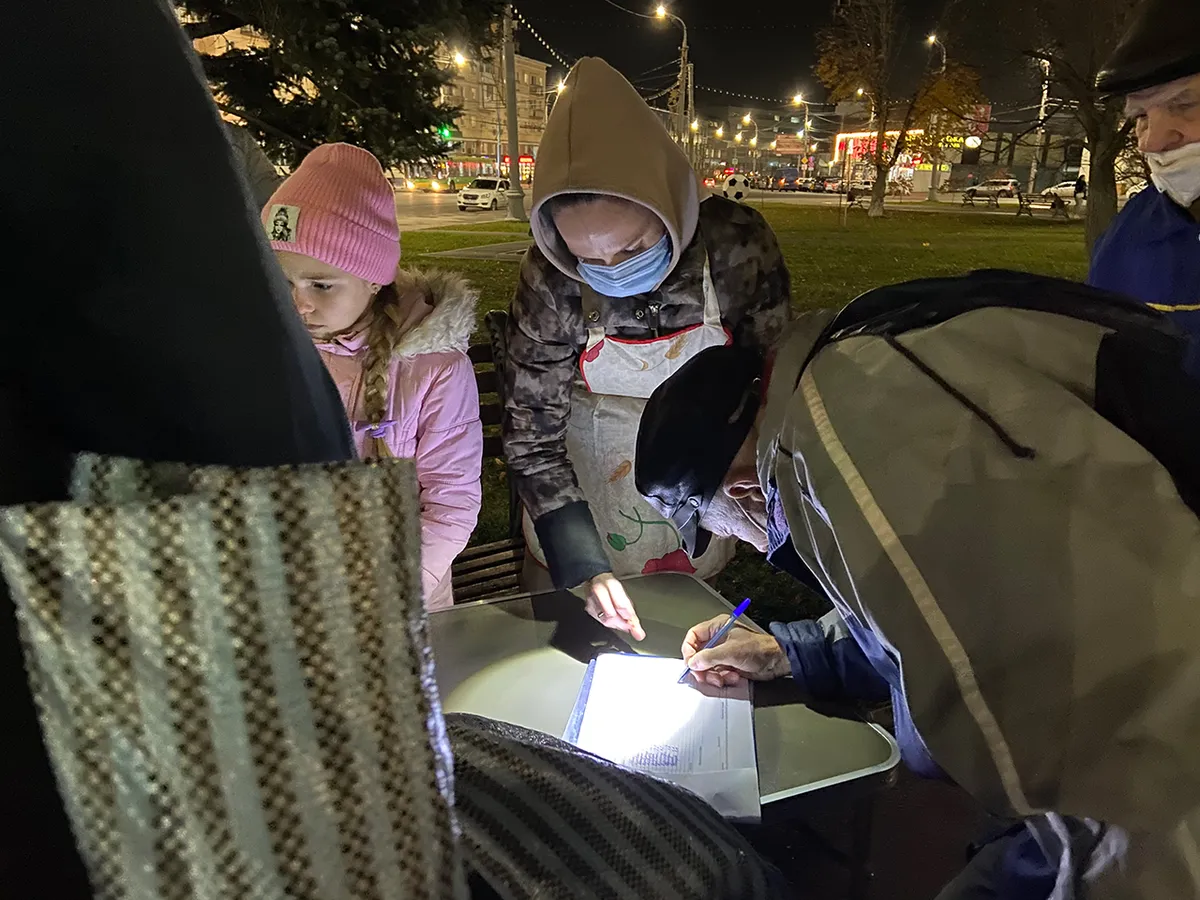
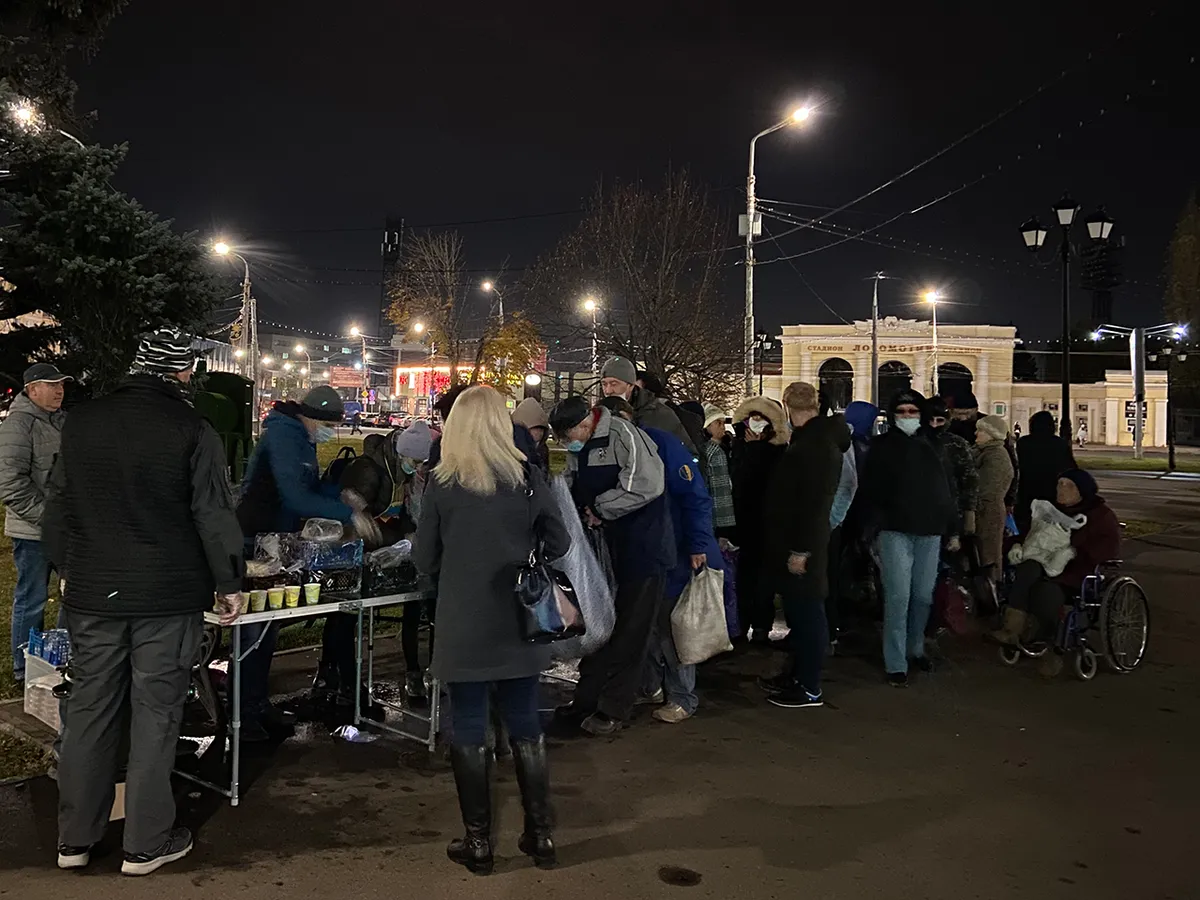
There is also a federal project called "Older Generation" in Russia, which operates until 2024. Its task is to create conditions for the active longevity of Russians. In particular it provides an opportunity for people from 50-years-old and up to undergo professional training in courses free of charge. According to the Ministry of Labor, this should help senior citizens find decent work. Since 2019, 230 thousand people have passed through the program.
Nevertheless, so far in Russia, both state and private initiatives to prevent loneliness cover only a tiny fraction of pensioners. At the federal level, there is not a single program for adapting people to retirement. And it is precisely such programs that would be very effective in combating loneliness, researchers from the Laboratory of Technologies for Improving the Well-Being of the Elderly at Tomsk Polytechnic University have found. They interviewed pensioners and found out that, alongside retirement, people experience an existential crisis — it’s hard for them to find themselves in new circumstances. To survive this crisis and move on, people need support from social services, particularly psychological support.
“Public services do not view old age as a period of active and productive aging, and therefore do not explore the possibilities of helping people adapt to this new stage in their life, which is clearly requested by older people,” the study authors conclude. "The state is the last bulwark of help for many lonely elderly people in Russia, because if they had some other source of support — family or friends — they would have already used it."
The loneliness of pensioners is a global problem in developed countries, the World Health Organization recognizes. In Japan and Great Britain, for example, there are entire ministries of solitude. Sociologist Dmitry Rogozin explains that their main task is to organize an environment for non-profit organizations and businesses, to give them grants so that they have every opportunity to help people cope with loneliness.
Such organizations form neighboring communities — both religious and of other interests — and organize festivals. “This creates a sense of community, life among the population,” explains Dmitry Rogozin. “People are herd animals, we need a supporting shoulder. It is pompously called ‘a spiritual community’ — the feeling that you are a part of a common undertaking and doings.”
"Many are lonely, but it’s hard to find them"
The Saratov Foundation "Good People" is forming one of these communities. The foundation has existed for a little over a year and now it helps three hundred families, some of its wards are elderly people. The "base" of the fund was the Church of the Holy Apostles Peter and Paul in the Leninsky district. For lonely pensioners, "Good People" has opened several programs: they teach older people computer literacy, and conduct sessions with a psychologist. There is even a club called "Old Grannies" in the church, the participants read and discuss the Bible at meetings.
One of the co-founders of the fund is 49-year-old Alexander Kovshutin, an entrepreneur, formerly a successful head of food-related holding companies. He’s a large man with a gray mustache. He and the second co-founder — Abbot Nektariy Morozov from the Saratov diocesan department for church charity — met by chance. They ended up in the same compartment on a train, and ended up talking all night. Upon arrival in Saratov, they began to discuss the creation of an aid organization. Alexander says that at first it was very difficult to find lonely old people who needed help.
“We are faced with such a problem: people who want to help and those who need help cannot find each other,” says Kovshutin. “They are afraid to ask, or they do not consider themselves in need, and they don’t talk about it. They found ways to survive in these conditions. For the most part, we do not know who lives behind the wall. We go out the door and put on the ‘we're fine’ mask. And how can you help a person if he does not talk about his problem?"
He recalls that a single woman had recently died in her home, and no one knew about her until a smell started to come from the apartment. “She did not have that little thing, that friend, who would call in the morning. And there are a lot of such lonely people, but it's hard to find them."
You can find similar stories regularly. Pensioners die alone, and their bodies are sometimes found months later. In October, the body of an elderly woman was found in Saratov. It had lain in an apartment for six months. In Voronezh, the body of a lonely pensioner lay for a year and a half before the neighbors were able to force open her apartment. In Moscow, a 90-year-old pensioner died of hunger next to the body of her alcoholic son. The neighbors called the Ministry of Emergency Situations when the smell began to spread through the ventilation system.
One of the areas that the fund works in is food aid. On the basement floor, next to the refectory of the church, groceries are piled in containers on a table to help the poor. Once a month, volunteers deliver “grocery kits” to their wards: a bag of buckwheat, a bag of rice, a pack of pasta, millet, peas, a package of sugar, a kilogram of flour, a bottle of sunflower oil, canned fish and meat. Sometimes sponsors from the cold storage plant donate frozen dumplings or pasties — a local dairy farm sells its products at a discount.
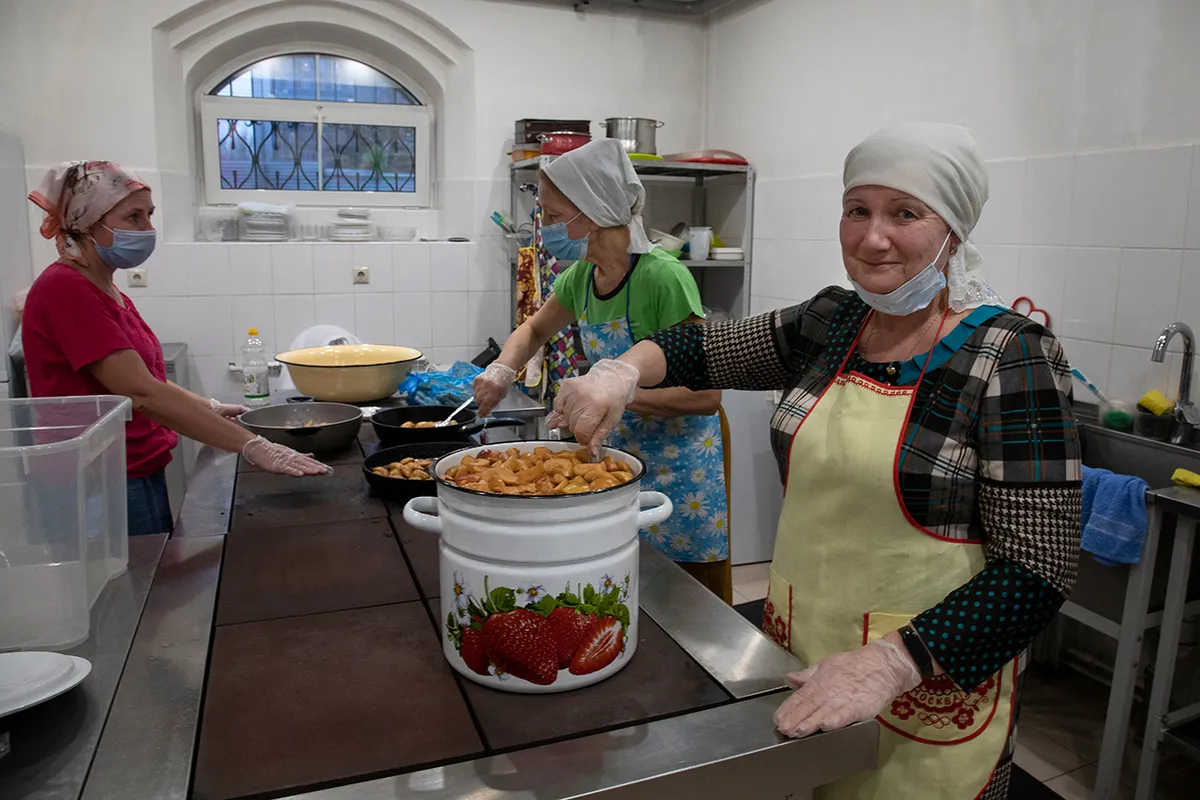
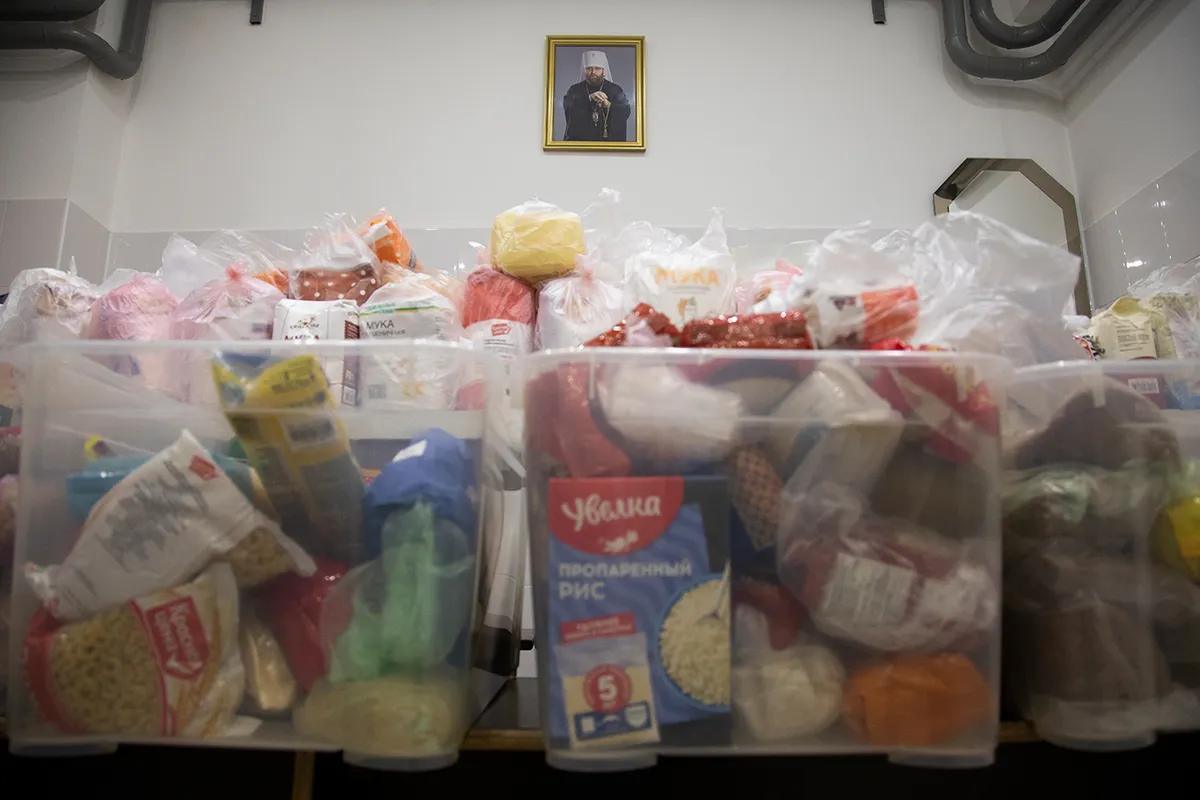
“According to statistics, in the Saratov region there are 350 thousand people living in dire need. So, in principle, it is not very difficult to find them,” hegumen Nektariy believes. “They are easily identifiable. It's just that sometimes people don't admit it, they don't talk about it. We also found those in need through surveys. When asked “Do you need help?” they said “no.” Then they began to find out what people eat, and understood that they objectively need it. If, for example, a person never eats meat or dairy products and buys pasta only at a reduced price, then he may not say that he needs help, but we will be able to understand it ourselves."
Once a week, volunteers prepare a hot meal to feed the poor, in particular retirees, in the square next to the city's train station. In the refectory of the church, dumplings are fried on two large stoves. Compote is boiled in a large enamel pot. There should be enough food for 70 servings.
"It’s impossible to calmly look at how people who have worked for many, many decades, live in conditions that you and I wouldn’t agree to live, and indeed could not. This is a colossal injustice for them"
“The problem is that it’s impossible to calmly look at how people who have worked for many, many decades, live in conditions hat you and I wouldn’t agree to live, and indeed could not,” says Father Nektariy. “This is a colossal injustice for them, especially when you have the opportunity to compare them with pensioners from European countries, whose life is just beginning upon retirement — they can see the world, they can get medical treatment, realize some of the desires they didn’t have time for before. Our pensioners can realize only one desire — to live out the remaining time more or less peacefully, but they don’t have enough money even for that. "
"To travel, we need to pay a European pension"
From Saratov, we drive to the village of Kutino, a hundred kilometers from the city. In recent years, Kutino has been slowly dying out — in the last elections, there were 292 people in the registration books, but in fact only about a hundred live here. And this number is decreasing. The school in Kutyin was closed, there is no kindergarten There is still a dilapidated church, St. Nicholas the Wonderworker, but no one is involved in its restoration.
There is no work in the village, so young people flee. The Saratov region is generally in first place in terms of population outflow. In the village, one of the main problems affecting the loneliness of the elderly is very noticeable — they simply have nowhere to go.
The only place for public life is a small chapel next to the church. Inside it’s clean, but very modest — a chandelier hangs under a ceiling covered with plywood, the floor is covered with variegated carpets. In one corner are pre-revolutionary icons decorated with artificial flowers. Rows of folding wooden chairs were donated from the House of Culture [a term for community centers in the former Soviet Union —Ed.] and the assembly hall of the now-closed school.
I ask the pensioners gathered in the chapel when they last traveled. They laugh in response:
“Yeah, you’ll be able to leave for ten thousand [rubles]. You couldn’t even go to the hospital again.”
“Would you like to?”
“Of course, really! Would it be bad to go somewhere to relax?”
“To travel, we need to be paid a European pension!” says Vladimir Ivanovich Babushkin, a large man in an unzipped down jacket.
Vladimir Ivanovich lives alone — his wife died three years ago. He says *to himself that he is a loner: “When there are two wings, everything is going well, with one it’s difficult. When one wing is knocked off, you can't fly with the other one. "
In his youth, Babushkin was a party organizer, an agronomist, and the chairman of a collective farm, "before the collapse of the Yeltsin system." Now his main occupation is household farming. “What else are you going to do?,” he says. "Everything’s done here, there’s no work!" A small plot also helps to stave off some loneliness — Vladimir Ivanovich says that with the last of his strength he works in the garden, "so as not to think about anything."
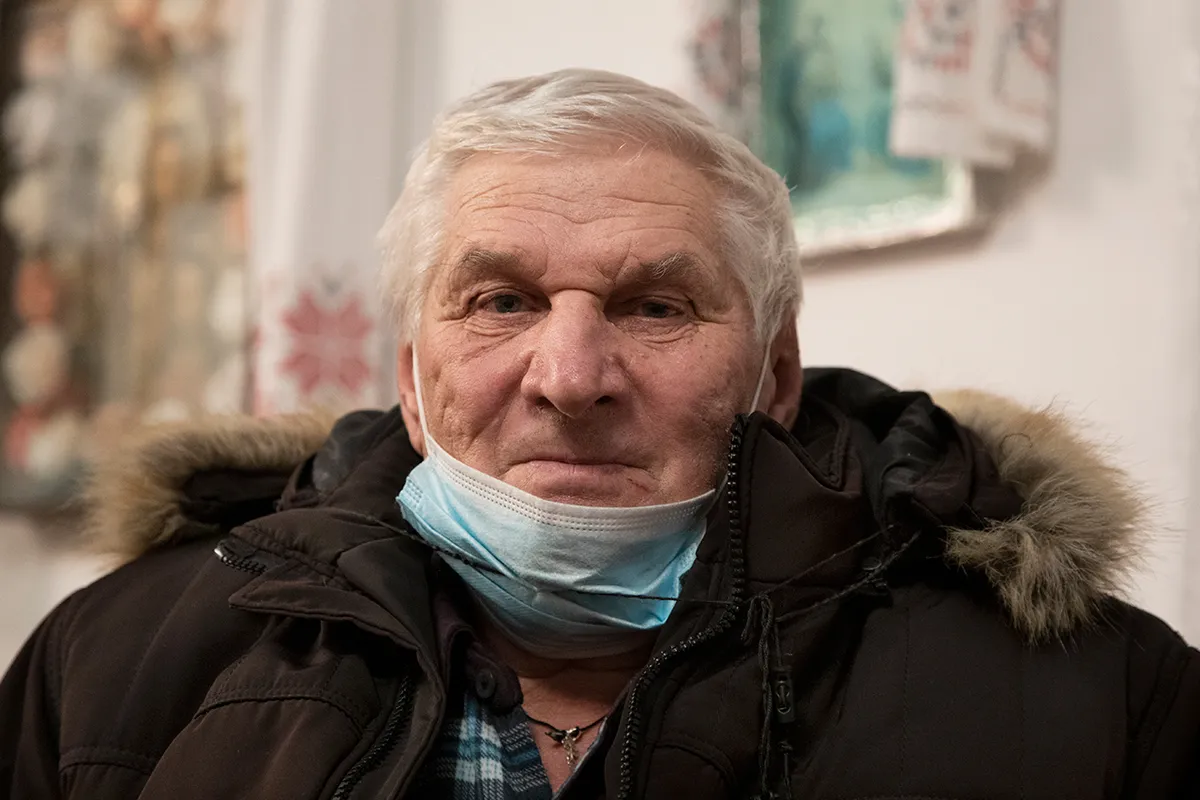
Babushkin's pension is barely enough to pay for utility bills — it costs about 6,000 rubles for one winter’s heat. But still, he regularly helps his grandchildren. He has seven of them. “Little by little I will give [something to] each one — and that's all, kaput, empty little hands!” the pensioner laughs. “To please the grandchildren is more important than to buy something for yourself. Grandchildren are the future. At least they will say, ‘Our grandfather was with us, he gave us a little.’ Though, the authorities will again not give a damn thing!"
I ask Vladimir Ivanovich if there is something with which he pleases himself, if he dreams of anything. “I don’t dream,” the pensioner replies. “I have a big dream: I would go to Crimea! Lord, as soon as you arrive, there are all these Muscovites ... "
Most Russian pensioners can only dream of traveling. About 40% of elderly Russians before the pandemic (in 2018) went on a trip at least once a year . But less than half of them traveled to rest, receive medical treatment, or see the sights. The rest went to visit relatives, to the forest for mushrooms or fishing. According to Rosstat, in 2018, 12% of Russians of retirement age answered that during the year before the survey they went to rest or were treated in a sanatorium, 4% were on a sightseeing trip. According to a survey by IPSOS, 12% of Russians aged 60-75 traveled in Russia in 2018, and 6% abroad. Only 3.8% of Russian pensioners traveled abroad before the pandemic. 1.5% pensioners-residents of rural areas traveled abroad once a year.
European retirees are more mobile: on average, 60% of Europeans aged 55–64 are engaged in tourism, among those over-65 the figure is 50%, according to Eurostat data. In Norway, 90% of people over-65 travel. In Finland, Norway and Sweden the number is about 80%.
For older people in Russia, not traveling is not a choice. A third of those who did not go anywhere attributed it to a lack of money. The rest are due to poor health or family circumstances. Only 15% of pensioners answered that they were not interested in such trips.
Only 4% of Russians of retirement age regularly engage in some kind of physical activity. In Europe, 32% of people over-65 engaged in physical activity, on average.
Only 1% of pensioners are involved in volunteering in Russia. In Europe — 21% of people aged 65-74 years. In Norway, Denmark, the Netherlands, and Luxembourg the number is about 40%. According to the authors of a paper “Concept for the Policy of Active Aging” in Russia, volunteering is an important stimulus to life for older people. It promotes a fair assessment of their contribution to public life and neighborly mutual assistance. “Older volunteers, as a rule, manage to maintain their mental health to a greater extent, they more often feel happy and satisfied with life,” the document says.
At the same time, Russian pensioners are not passive recipients of aid: according to a HSE study , half of people over-60 make charitable donations, including giving alms. Moreover, 15% do it often.
Before the pandemic, a third of retirees attended at least one cultural event a year, be it a concert, play, film or exhibition. The same number went to a church, mosque or other religious institution, or to a meeting of believers. But most Russian pensioners, as a rule, just sat at home.
The social activity of pensioners is concentrated within the family. Thus, 70% of Russians over working age say that they meet with relatives or friends at least once a week. About 40% see their grandchildren several times a week. “The image of a pensioner, including in the eyes of the elderly themselves, is still mostly associated with illness and the need for support, the role of grandparents; travel, self-development and social activities of the elderly remain exotic occupations,” says a scientific article on the social activity of the elderly.
At the same time, according to research data, close communication with those who are equal in age and interests — with spouses, friends and acquaintances, like-minded people — helps better against loneliness than communication with their adult children and other relatives.
“I had a friend, we loved to go to concerts,” recalls Taisiya Mikhailovna from Saratov. She, like the inhabitants of Kutyin, can no longer afford travel or cultural entertainment. “We went to the theater, to the cinema, to the center (downtown probably*). We liked to go to the center. "Central" cinema, "Udarnik". Where Centralny was, there was an ice cream parlor called Lakomka. We always took an ice cream 150 grams before eating a movie.
- Would you like to visit somewhere now?
- I would like to. I sometimes walk by the cinema and never see people nearby. I even once asked young people, "Do you go to the cinema now?" Previously, there was always a crowd near the cinemas. There were queues to buy tickets, and you didn't have to buy a ticket just for the required showing. Oh, they loved the movie very much.”
"It's better to live badly, but not die"
Taisiya Mikhailovna has no children. Her fate was determined by work at the plant: at the age of 16, still without education, Taisiya was taken to the research institute "Volna," as a radio equipment tester. After nine years of testing, she began to develop health problems. A little later, she found out that she would never be able to have children.
Taisiya Mikhailovna goes over the dates of deaths of people close to her, trying to remember in what year her husband Volodya died, with whom she lived a happy, albeit childless life — “It was probably 1989, when we went into retirement. He was a very simple and kind person, passionate and hard-working. "
After the death of her husband, the pensioner returned to her native Atkarsk in the Saratov region to live with her sister. In 2009, her sister died. So Taisiya Mikhailovna remained all alone in the spacious parental *home.
A couple of months ago, she broke her hip and was stuck in the hospital for a long time. She was ordered to be taken from the hospital to her relatives. And there were no relatives who needed her. So Taisiya Mikhailovna ended up in Saratov again. She gave her own Saratov apartment to her elder niece, her brother's daughter, and she moved into a separate room in his apartment.
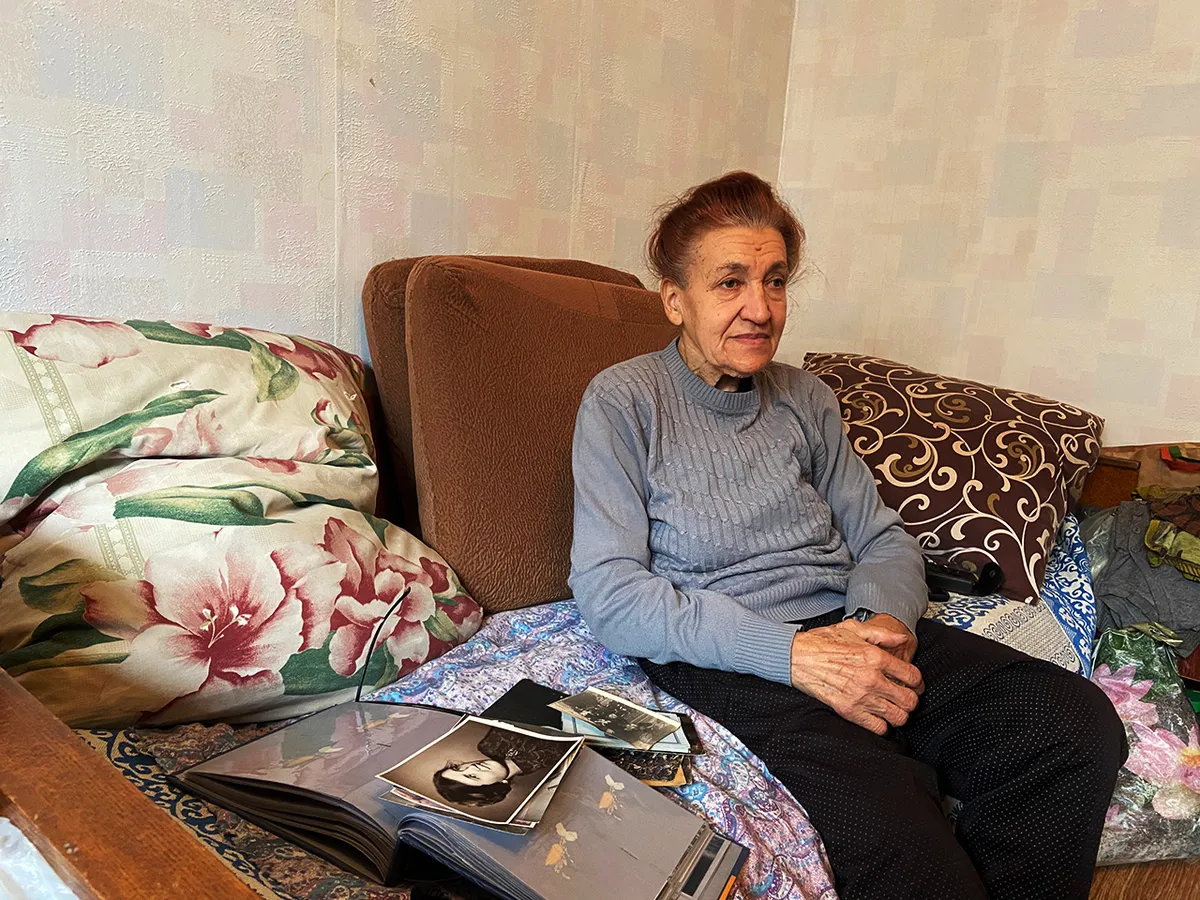
It is hard and uncomfortable to live in this new place for Taisiya Mikhailovna: almost no hot water comes from the tap, and her relatives didn’t transport her things from the old house to their apartment. Some things were saved: the photographs of Taisiya Mikhailovna's family, even pre-revolutionary ones, which she keeps in a plastic case.
“My whole head is ringing with the fact that I’m not needed, and I don’t know what to do,” says the pensioner. “I don’t want to die. It’s better to live badly, but not die. I want to live even to help my niece during the most difficult times, while I am still walking. Maybe they will be better later."
Loneliness prevention
The current generations of Russians who have not yet entered the retirement age have a chance to spend their old age differently, sociologist Dmitry Rogozin is sure. He identifies several trends that open up these prospects for young people: the trend for lifelong learning, for employment at any age, for travel, for constant communication on the Internet and the preservation of interest in intimate relationships and sex in old age.
"If you come to the old ladies, they call themselves girls among themselves!"
In the meantime, despite the fact that two-thirds of Russians of pre-retirement age with higher education and a quarter with secondary education are ready to study, they often face ageism - age discrimination. “Today it is still considered normal in the field of education to write: 'We are assembling a summer school for students under 25,' says sociologist Dmitry Rogozin. - This ageism is very strong. If you come to the old ladies, they call themselves girls among themselves! Biological age and attitude to biological age is a social construct. "
It is also not easy to find work in pre-retirement or retirement age in Russia. For older Russians, more than half of the vacancies in the labor market are closed: according to a Superjob survey , a third of employers are not ready to hire pensioners, and the same number are ready only as an exception. Employees often have a negative attitude towards older colleagues, consider them to be behind the times and profession. Moreover, now the Russians are driven to work on retirement by financial need, and not their own desire, follows from a poll by VTsIOM. Most of the respondents named low pensions and the desire to financially help children and grandchildren as the main reason for retirement. For a third of the respondents, the reason to work is a desire to avoid loneliness, and only for a fifth - an interest in work.
Dmitry Rogozin believes that it will be easier for the next generations of retirees to keep their jobs, because they are becoming more flexible, there are more opportunities for distance and part-time employment. Work helps to avoid loneliness only if it is loved. Among those who are satisfied with their professional activities, 2.6 times less are lonely than among those who are engaged in an unloved business.
Nowadays, most Russian old people hardly leave their homes, but Rogozin is sure that physical activity and travel, like education, are gradually becoming "the property of all ages — and the further it goes, the better it will be presented."
The Internet and social networks are also becoming a kind of prevention of loneliness in old age. "How can you be lonely, even if you are in a wheelchair, if you have a lot of relationships that are not related to being here and now?” says the sociologist.
But the main thing that one must not lose in old age, according to the sociologist, is love and intimate relationships. “Intimacy, physicality, love for your body, the presence of a partner — now comes the understanding that this is not limited by any age,” says Rogozin. Modern old people need to be constantly reminded of this. I believe that in our old age it will no longer be necessary to do this.”
But the main thing that one must not lose in old age, according to the sociologist, is love and intimate relationships. “Intimacy, physicality, love for your body, the presence of a partner — now comes the understanding that this is not limited by any age,” says Rogozin. Modern old people need to be constantly reminded of this. I believe that in our old age it will no longer be necessary to do this.”
Editor: Alexandra Zerkalyova